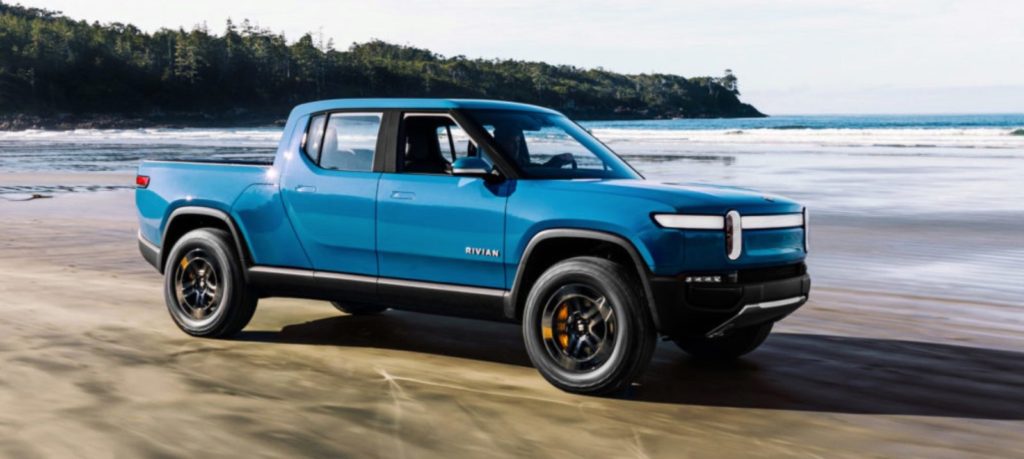After the forced shutdown caused by the Covid-19 pandemic, auto manufacturers are finally able to pick up where they left off and have begun to resume operation. The next step is to now adjust existing timelines and assess supply chain stability after the three months of lost time.
The shutdown has caused delays for several EV manufacturers including Rivian. The Plymouth, Michigan manufacturer, like all other automakers, has seen delays in all aspects of its production. The company’s R1T electric pickup was originally expected to start deliveries later this year but has since seen its release date pushed to 2021. As the country and world for that matter brace for a second spike in coronavirus cases, it could mean more delays for the EV startup.
Rivian owns a manufacturing plant formerly owned by Mitsubishi located in Normal, Illinois. The company has yet deliver a single vehicle but has proven its fundraising skills with the impressive amount of investments it has received from big wig names. The company released a video of its facility in April showing an alarming number of incomplete areas. IHS Markit automotive industry analyst, Matteo Fini, reported the absence of conveyor belts and parts of the retrofitted paint shop, leading us to believe there is still a lot left to complete.
In order to follow through with a 2021 market launch, Rivian must complete its assembly line on top of diving into full production of its truck but the end of the third quarter of 2020. Being up and running by summer of this year is essential if the company wants to see meaningful sales volume.
Another obstacle the company will face is setting up retail and delivery networks during a global pandemic. AutoPacific industry analyst, Ed Kim stated in a interview to Forbes “They need to establish service centers, parts and a process for trade-ins all within the next 11 months.” He added “However, expertise from investor Cox Automotive may work in their favor.”

During a time when there isn’t a global pandemic wreaking havoc on the auto industry, even established automakers experience production obstacles when introducing a new vehicle to the market. As we see the health of the global economy deteriorate we could also see Rivian experience assembly line setbacks regardless of the veteran industry experts the EV start up has hired. Rivian’s R1T plant has a 5 stage reopening plan and is currently operating under Phase 4.
As employees begin returning back to work and the possibility of another Coronavirus spike looming over the nation, their jobs may be impacted in other areas of the world as well. The intricacies of an electric car is seen in the roughly 17,000 parts that it is made of. Should a supplier in a different part of the world be forced to shutdown due to Covid-19, Rivian will be presented with the time staking task of finding an alternative source for that component. Almost certainly resulting in further delays.
The R1Ts original 2020 launch date gave it the first to market advantage. Although its newly announced 2021 debut still means it will be the first company to release an all-electric truck, General Motor’s GMC Hummer EV is right on its heels with a launch date only a few months later.
Ford has plans to introduce its electric F-150 in the middle of 2022. Should Rivian see any further delays whether it be due to Coronavirus or not, the R1T could collide with the release of the F-150. Tesla is also on it’s journey to release it all electric Cybertruck pick up, however there are few released details of an exact timeline surrounding its highly anticipated release. Its launch date is expected to be in 2021.
With tough competition in the “high-dollar electric pickup segment,” the startup could still hold its own. It’s modern product and attractive design along side its auto lending platform is surely beneficial. “Ford and Hummer products—as impressive as they are likely to be—run up against the stigma of coming from mainstream auto brands,” Kim said. “Ford has a ton of competency at building trucks, but in the end, it will still be an F-150,” he added.
The anticipation of the upcoming electric pickups is continuing to grow and it will only be a matter of time before it has secure place on the market. “While mainstream customers need a truck, current reservation holders want to make a statement,” Kim said. With the sales of the Tesla Model 3 and Model Y steadily increasing regardless of the competition brought by electric crossovers it seems to be evidence that better-known manufacturers won’t completely trample EV start ups.

